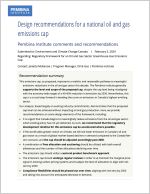
The Government of Alberta, in its technical submission to the Government of Canada regarding the proposed oil and gas sectoral emissions cap, cites analysis undertaken by the Conference Board of Canada. This report seeks to contextualise that analysis and some of the key assumptions that appear to underpin it.
We find that, overall, the Conference Board’s findings regarding economic impacts of the cap in 2040 are based on modelling of oil and gas production that only extends to 2030, and does not appear to account for likely market-based declines in global demand and, therefore, Canadian production post-2030. As a result, the Conference Board concludes that a cap on emissions could only be achieved through arbitrary production cuts. This conclusion is not supported by the broader body of evidence on the likely global market for oil and gas post-2030.
The Conference Board’s modelling of future emissions in the sector also does not include any decarbonization projects that have been proposed but are yet to begin construction. Notably, this means the oilsands Pathways Alliance consortium’s proposed carbon capture and storage project, which the Government of Alberta itself regularly cites as an example of decarbonization work taking place in the sector without the need for an emissions cap, is not accounted for.
The Government of Alberta’s submission to the Government of Canada highlighted a potential $1 trillion loss to nominal GDP as a consequence of the emissions cap. We note, however, that this assumed loss was based on the Conference Board’s least ambitious scenario on methane abatement, which the Conference Board itself states is the least likely scenario.
We recommend that all stakeholders carefully assess the assumptions that underpin any analyses cited in such submissions. Doing so would ensure that potential impacts of proposed policies – in this case, the economic impact of the emissions cap on Alberta’s oil and gas sector and its broader economy – are neither inflated nor downplayed.


